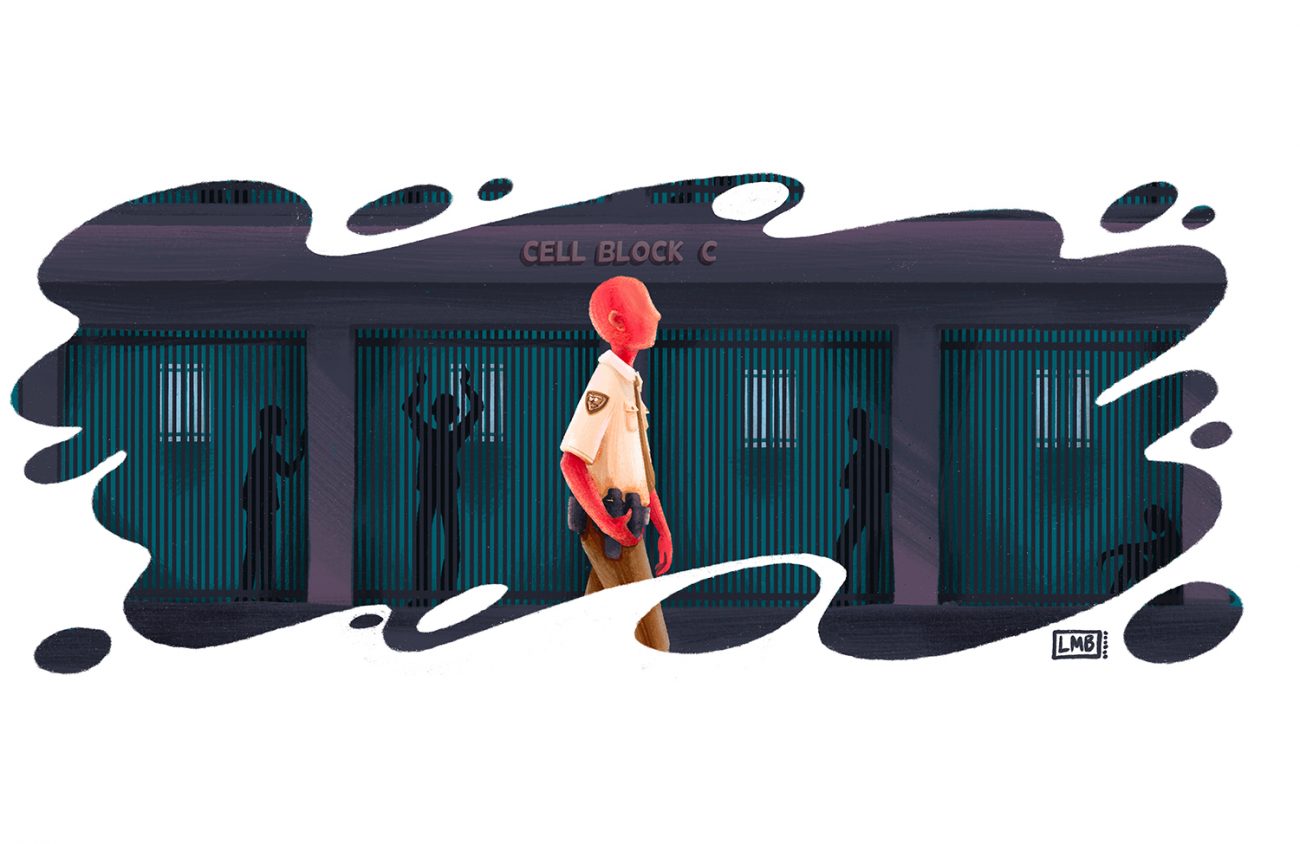By James
He makes his way down the third level of the narrow tier, walking slowly, his set of keys jangling at his sides. As he passes each cell, he takes a quick, practiced look, observing behavior, taking note of anything suspicious. Does he smell tobacco, marijuana or the sour, unmistakable scene of “pruno,” prison wine? Does he see pornography or paperclips, pushpins or pens with ink other than blue, all potential tools of the prison tattoo artist?
The tier walk is a routine he’s completed four times in the past hour. Sixteen times on this shift alone.
“Hey officer!” one of the prisoners yells. It’s coming from one tier above, maybe 10 cells back. He’s used to this. He ignores it, keeps walking.
He tries not to make much eye contact with the prisoners as he passes. He wants to acknowledge them. But he can’t. He was warned about getting too close when he was trained.
Each year he gets an additional four days of training, most of which consists of his superiors reminding him that distance from prisoners is the key to having a successful career. So he walks, and his keys jangle, and all the while he thinks about the question he always wrestles with: “What’s the point of all this?”
He’s a prison guard. His duty is to maintain order and suppress signs of mutiny. The job is much different than what he expected. When he applied, he thought he’d be helping men gain the confidence and skills needed to make it outside.
But his job is to supervise their warehousing.
“Hey officer!” the prisoner on the tier above yells again.
He’s startled by the sound of a cell door suddenly being kicked. It might be an emergency. If it is, he can be written up for not responding.
“Yeah, what do you need?” he yells out.
“Oh, not much. Just for you to go fuck yourself!”
The tier comes to life, dozens of men laughing.
Nice. Comments like these are nothing new. Some of the boys have issues. He tries to understand. Tries not to take it personal. Usually he can mediate the problem. It’s an approach other guards frown on, most of them favoring a more heavy-handed approach. But he realized early in his career that this only riles up the men and creates distrust and volatility.
He thinks about the prisoner who just yelled. Usually quiet, spends most of his time sitting on his bunk. Visits are rare for him, the last one informing him that his mother had recently passed.
He continues walking. He notices a man praying, eyes closed. He sees other men hunched over the small desks mounted to their cell walls, pencils in hand, writing letters. Maybe they write to a wife, or to a child. Maybe to someone they’ve wronged.
Maybe they write simply to feel that their voice hasn’t been forgotten in a world they’re no longer part of.
When he does his tier checks, he always notices them noticing him. This two-way game of who’s watching who made him nervous at first. Now it’s just part of a routine. Sometimes he feels like telling them that it could have been him sitting behind those bars had it not been for luck or better circumstances.
But he can’t. Can’t show vulnerability. Can’t appear to have anything in common with them that they’d use against him. Potential manipulation tactics, that’s what his training calls it. He was warned. Repeatedly.
He often questions his sense of purpose in this career, but he knows that his family depends on his paycheck. As he passes the last cell on the tier, he takes a deep breath and looks at his watch. He has 15 minutes to talk with the disgruntled prisoner before he has to walk the tier again.
He climbs the stairs to the fourth tier and opens the bar box that houses the cell’s locking mechanism.
“Cell 439!” he yells. “Come on down, let’s have a chat.”
The prisoner walks down the tier, head down. The guard can tell that he’s embarrassed. No need to make it worse.
“You alright 439?” he asks him. “I know you’re waiting for medication line. It’s running a bit late tonight. How about a little more patience next time, sound fair?”
“Yes sir. I’m sorry.”
A few minutes later, he readies himself for another tier walk. His thinks about the system’s approach to criminal justice — mostly punishment, little rehabilitation.
He wanted to be a corrections officer. He sighs. ν
James, sentenced as a teenager and now behind bars for more than two decades, imagined himself inside the mind of a prison guard to write this piece. It is not just an act of imagination. It is a feat of empathy. James is a member of Lauren Kessler’s Lifers’ Writing Group.
